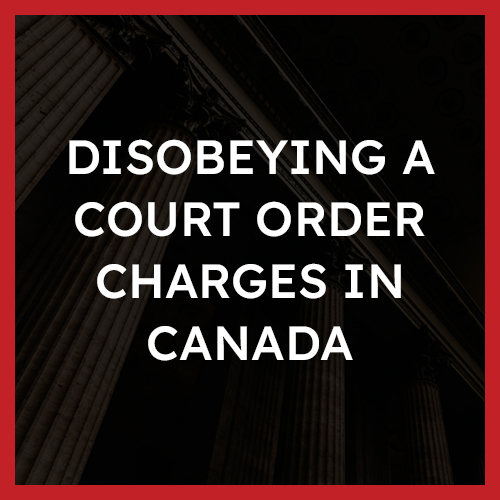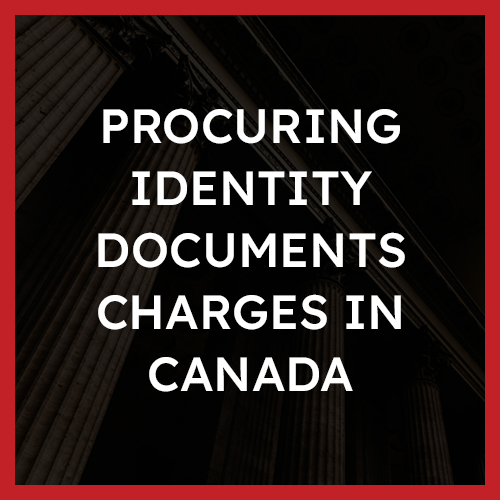Disobeying a Court Order (s. 127) Charges in Canada: Offences, Defences, Punishments
What is “Disobeying a Court Order” in Canada?
 Disobeying a court order is criminalized under section 127 of the Criminal Code.
Disobeying a court order is criminalized under section 127 of the Criminal Code.
Disobeying a court order is any defiance of an order made by a court or disobeying any type of order made by a person or body who is authorized to make such an order via a provincial or federal law or statute. Disobeying a court order is often only laid as a charge if there is no other alternative and appropriate charge included in any other legislation.
As per section 127(1) of the Criminal Code, this offence is a hybrid offence which means that the Crown may elect to proceed summarily (less serious category of criminal offences) or as an indictable offence (more serious category of criminal offences).
Examples
Some examples of disobeying a court order might include:
- Failing to appear in court after being subpoenaed as a witness.
- Failing to abide by a court-ordered injunction.
- Failing to abide by a court-ordered publication ban.
- Breaching a probation order.
Defences
While not all cases are the same and therefore, not all defences apply to every case, below are some common defences to disobeying a court order:
- Lack of mens rea
- Alternative Act argument
- Lawful excuse
- Applicable Charter defences
Punishment
So long as no other statute or law (either provincial or federal) provides for a punishment specific to the act or omission in contravention of the court order or other order provided by a lawful authority, the accused can be found guilty and sentenced to a maximum of two years imprisonment if charged with an indictable offence. There is no minimum sentence for disobeying a court order. Again, the prospective sentence will depend on how the Crown elects to proceed.
- For indictment: Up to 2 years imprisonment.
- For summary: Up to 2 years less a day imprisonment and/or a $5,000 fine.
Overview of the Offence
127 (1) Every one who, without lawful excuse, disobeys a lawful order made by a court of justice or by a person or body of persons authorized by any Act to make or give the order, other than an order for the payment of money, is, unless a punishment or other mode of proceeding is expressly provided by law, guilty of
(a) an indictable offence and liable to imprisonment for a term not exceeding two years; or
(b) an offence punishable on summary conviction.
As noted above, section 127 is only relied on when there is no other statute or law which covers the impugned act of disobedience or contravention. To be found guilty of disobeying a court order, the court must prove the actus reus (guilty act) and mens rea (guilty mind) elements of the offence. These are discussed directly below.
The Guilty Act (Actus Reus)
The actus reus refers to the culpable act or omission that one commits.
For a section 127 offence, the actus reus is proven when the Crown shows that:
- A court order was made;
- this order is made by a court of justice or person or body who is authorized by any act to make the order
- the accused disobeys the order;
- the Crown shows that the order was not an order made for money; and
- there is no alternative punishment or means of proceeding legislated elsewhere.
The Crown must show ALL of these criteria. It is not sufficient to show that one or only some of these are met. In a case known as R v Clement, the Supreme Court of Canada determined that the orders contemplated by section 127 included all orders made by a court, not merely criminal or quasi-criminal ones (see: R v Clement, 1981 CanLII 212 (SCC), [1981] 2 SCR 468).
The term “expressly provided” in section 127 means that the punishment or alternative means of proceeding is set out in statute law. Furthermore, in R v Gibbons, 2010 ONCA 77 (CanLII), the Court established that the phrase “provided by law” refers only to statute law and not common law (judge-made law).
Examples of orders that might be made by a court but are legislated elsewhere include any failure to attend court as required by a subpoena or failing to remain in attendance because this is rather criminalized under section 708 of the Criminal Code and therefore, the punishment for such an act can be found there instead. Furthermore, while a court may order that one not breach his or her bail conditions, remedies for when one breaches the terms of a recognizance before perfecting bail are set out in section 524 of the Criminal Code.
The Guilty Mind (Mens Rea)
The mens rea or mental element of an offence speaks to mental culpability or otherwise the accused’s intent when committing the offence. Here the only criteria for which the Crown must prove includes the intentional commission of the prohibited act and knowledge of the prohibition. Without these elements, a section 127 offence cannot be made out.
Disobeying a Court Order Defences
The availability and strength of any defence depends entirely on the specific facts of one’s case. However, the following are some common defences that may be used when fighting a section 127 charge:
Lack of mens rea
As noted above, the Crown, to secure a conviction, must show the mental elements of the offence. This includes showing that the accused intended on disobeying the court order and that the offender knew that the court order was in place at the time of its breach. If the Crown is unable to demonstrate this, or the defence can show that the accused did not meet the requisite mental intent elements of this offence, a conviction cannot be made. This type of defence will depend on the available evidence. For example, demonstrating after breaching a publication ban that the publisher of information had reason to believe that the publication ban had expired or had been lifted before any information about a proceeding was published, could be a possible scenario for which the mens rea elements of a section 127 offence are not made out (see: R v Star Phoenix 911909, 2003 SKCA 108 (CanLII)).
Alternative Act argument
If charged with a section 127 offence, a defence lawyer will look to other statutes to ensure a section 127 charge is applicable. Because section 127 explicitly states that the section is only pertinent should there be no other punishment or proceeding expressly provided by another law, a defence lawyer will ensure that any charge against you is appropriately laid and will counter any frivolous or unfounded charges.
Lawful excuse
As explicitly stated in section 127 itself, there is no offence where the accused has a lawful excuse to disobey the court order. If the evidence supports such a defence, the accused may demonstrate that they had a lawful excuse to breach a court order.
Applicable Charter Defences
The Canadian Charter sets out your rights and freedoms before and after your arrest. If the police fail to abide by these rights, either deliberately or inadvertently, it could aid in your defence. If any of your Charter rights have been violated before or after your arrest, you may be able to have some or all of the evidence that the Crown is relying on to secure a conviction excluded under section 24(2) of the Charter.
It is important to note that section 127 of the Criminal Code has been found to be constitutional and not overly broad by the Supreme Court of Canada in a case called R v Gibbons, 2013 ONSC 1403 (CanLII). Therefore, arguing against the constitutionality of the law is not, currently, an available defence.
Disobeying a Court Order Punishment
The punishment for disobeying a court order can range. This range depends on two main factors: how the Crown elects (the Crown may proceed by way of indictment or as a summary charge) and the mitigating and aggravating factors presented to the court at sentencing. If the Crown opts to proceed by way of indictment, the maximum penalty for disobeying a court order is 2 years imprisonment. If the Crown proceeds summarily, the maximum sentence is 2 years less a day and/or a $5000 fine. There is no minimum punishment for disobeying a court order.
The court is not limited to ordering terms of imprisonment (all dispositions are available) and other ancillary or standalone sentencing orders may be ordered. Some of these include:
- Absolute or conditional discharge (see: section 730 of the Criminal Code)
- Probation (see: section 731(1) of the Criminal Code)
- A suspended sentence (see: section 731(1)(a) of the Criminal Code)
- A standalone fine (see: section 734(1) of the Criminal Code)
- A conditional sentencing order (see: section 742.1 of the Criminal Code)
Frequently Asked Questions
What is the penalty for disobeying a court order in Canada?
The penalty for disobeying a court order can range, however, the maximum penalty is 2 years imprisonment if charged by indictment (more serious category of criminal offences) or maximum 2 years less a day imprisonment if charged summarily (less serious category of criminal offences). Note that there is no minimum penalty for disobeying a court order and all prospective sentencing dispositions are available for a court to make. You can read more about punishments related to section 127 charges here.
Can you go to jail for disobeying a court order?
The simple answer is, yes. Imprisonment is a possible sentence for disobeying a court order, but not a mandatory sentence. One of our lawyers can consider your case and inform you, based on the facts of your case, on the likelihood of receiving a jail sentence for disobeying a court order as penalized under section 127 of the Criminal Code.
Disobeying a court order in Canada a serious offence?
Of course, all offences criminalized under the Criminal Code are indeed serious offences and can carry weighty consequences such as a criminal record. Nevertheless, relative to other types of crimes embedded in the Criminal Code, disobeying a court order can be argued to be a less serious type of offence. This is supported by the fact that there is no minimum sentence attached to a section 127 conviction, section 127 charges are infrequent and furthermore, the Crown has the option to proceed summarily (less serious category of criminal offences) if they deem fit.
Published Decisions
R v Beckles, 2022 ONJC 116 (CanLII)
Mr. Beckles was charged with two counts of failing to comply with his probation order. Both counts arose out of incidents where Mr. Beckles failed to report to his probation officer on two separate occasions. The Crown elected to proceed summarily, and the court found Mr. Beckles guilty on both counts.
You can read the full case here.
R v Solar, 2012 SKQB 113 (CanLII)
The accused breached a court order that required Mr. Solar to return money to the victim of a theft he committed. The court order imposed a deadline for this action. When there was a delay in returning the money to the victim, the Crown charged Mr. Solar with a section 127 offence. The court did not find Mr. Solar guilty of the section 127 offence because it contended that the Crown failed to show that Mr. Solar intended on disobeying the court order.
You can read the full case here.
R v Swanson, 2003 BCSC 1124 (CanLII)
Mr. Swanson was charged with a section 127 offence when he failed to comply with a condition of his recognizance which ordered that he not go within 50 meters of his mother’s home. Mr. Swanson obsessively visited his mother’s home and was arrested while there. The Crown opted to proceed by way of indictment. The court considered whether a term of imprisonment would be a fair sentence to impose and ultimately landed on imprisoning Mr. Swanson because the means to reaching an end where Mr. Swanson would leave his mother alone seemed only achievable through placing Mr. Swanson in prison.
You can read the full case here.
About The Author
Ask A Question
We endeavor to respond to questions within 24 hours. If your matter is urgent, please call our office or submit a request for a free consultation.







